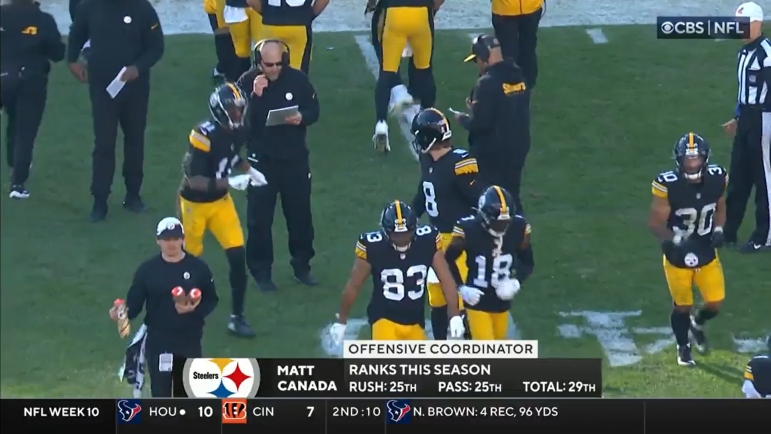It’s never just one thing that went wrong, or one person at fault, when a team decides to fire a coach in-season. Barring non-professional reasons, anyway, it takes quite a composite of ineptitude in order for an organization to make such a move. That’s true to a greater extent than any other for the Pittsburgh Steelers.
And the players feel responsible for the decision to fire offensive coordinator Matt Canada, the only instance on record in which a coach was fired in-season by the team in its 91-year history. One can argue that the Steelers should have fired him before the season started, but he was let go now for reasons beyond just his own job performance.
Nobody bears greater responsibility for Canada’s firing on the field than does QB Kenny Pickett, who leads one of the most inefficient passing offenses we’ve seen in a while—certainly among teams with a winning record.
“I feel like you have to take it personal”, Pickett told reporters yesterday, via Brooke Pryor of ESPN. “It’s a guy you’ve worked with since I got drafted here, you want to play great, you don’t want to see anyone get let go like that”.
Chances are Canada would still have a job if Pickett were simply playing at a higher level. He almost undoubtedly still gets fired at the end of the season, but the change was made now because the performance of the offense as a whole was simply unsustainable.
“Him losing his job and being fired is on all of us”, Pryor quotes C Mason Cole as saying. “It’s on all the coaches and all the players. We weren’t good enough for him to keep his job, and that falls on not just him [but] on all the us”.
In no way is there defending the job that Canada did with the Steelers as offensive coordinator over the course of the past two-and-a-half years. But the number of miscommunications, missed assignments, and missed reads stack up to an awful lot of missed opportunities for the plays as called to succeed.
In other words, the issues run far deeper than just the person putting the offense together and calling the plays. That doesn’t mean the change shouldn’t have been made, or that the people replacing his tasks won’t do a considerably better job.
But in order for things to get better, everything has to get better. The communication has to improve. The execution errors need to be minimized. The missed opportunities due to poor reads and misidentifications have to be addressed.
An offensive coordinator plays some role in all of those things, of course, and perhaps that’s where Canada failed most of all. There are plenty of elements of the system that he ran, the plays that he called, and the timing of when he called them, that are more than fairly open for criticism.
But things could have looked so much better if the product on the field were better executed. And much of that falls outside the purview of the coordinator. Much of it falls on the players. So it’s only right for them to feel some degree of responsibility for the message now being sent.








